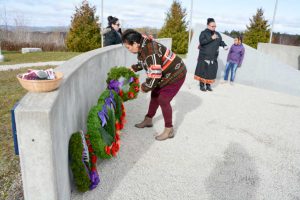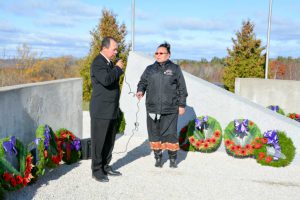BIRCH ISLAND—Much of the Birch Island community braved the cold north wind to pay tribute to their warriors during the annual Remembrance Day ceremonies held at the Whitefish River First Nation (WRFN) Veterans’ Memorial, which marked its 12th year.
Master of ceremonies Martha Shawanda welcomed all to the ceremony, introducing WRFN councillor Esther Osche.
“Thousands of aboriginal men and women enlisted in Canada’s armed forces,” she began. “Aboriginals served in units with other Canadians and in every theatre in which Canadian forces took part.”
More than 500 (First Nations) servicemen lost their lives in foreign battlefields during the world wars with the number of casualties and injuries much higher, Ms. Osche told the large group. “How remarkable that the percentage of enlistments among the Anishinabek is fully equal to that among other sections of the community.”
In World War I, Status Indians were prohibited from recruitment for fear of their war tactics and how Germany would respond, the councillor explained. “Despite being prohibited from recruitment, many dedicated aboriginal men had still enlisted,” she said. “It is believed that some militia units were unaware of the prohibition or decided to ignore it for they were proud to be associated with their ‘fellow subjects’.”

photos by Alicia McCutcheon
When conscription came into place during the Great War there was no exemption for aboriginals. It wasn’t until January 17, 1918, after much aboriginal lobbying, that the government passed an order that would exempt aboriginals from the Military Service Act. Nevertheless, enlistments among the aboriginal communities continued to reach large numbers.
Ms. Osche shared some facts about WWI: more than 4,000 aboriginals had enlisted for service; approximately 35 percent of all Status Indian males of military age had enlisted for service; and approximately 100 Anishinaabe men from isolated communities in Northern Ontario enlisted at the Thunder Bay recruitment office.
“Aboriginal soldiers were lauded as effective snipers and scouts; in battle, the skills of the Indian hunter and warrior came to the fore,” Ms. Osche said. “Aboriginal soldiers were seen to be adaptable and patient, with keen observation powers, stamina and courage. Correspondingly, an aboriginal background sometimes placed aboriginal soldiers in the most hazardous jobs that the army had to offer.”
“Aboriginal peoples, like all other Canadians, were called upon to make sacrifices and contribute to the national crusade,” Ms. Osche continued, speaking of WWII. “Aboriginal service personnel were among the casualties at Hong Kong and Dieppe, they fought in Italy and Sicily, served on convoy escorts in the Battle of the Atlantic and flew with bomber and fighter crews around the world. They landed with the 3rd Canadian Infantry Division on D-Day and fought through the campaigns in Normandy and Northwest Europe.
Despite the high number of enlistments, as the War went on, more manpower was needed and once again conscription was put into place, Ms. Osche added. Just as in WWI, aboriginals had fought for their right to be able to choose to volunteer their enlistment. As of 1940, the government’s final decision was that aboriginals would not be exempt from the Military Service Act.
On the home fronts, as had been the case in the First World War, women’s service clubs and community groups donated and raised funds for the Red Cross and other war charities, Ms. Osche said. By the end of 1945, bands officially had donated $23,596.71.
“For some aboriginal soldiers, military service was an adventure, an opportunity to demonstrate their loyalty to the King and Queen; for others it was a chance to perpetuate a warrior tradition,” she added.

The Wikwemikong Singers drum group then sang a Flag Song followed by Tim McGregor reflecting on ‘honouring our veterans,’ not just on Remembrance Day, but each day.
Veteran Gerald McGregor then read In Flanders Fields followed by two minutes of silence.
As the names of Whitefish River First Nation’s veterans were read aloud, wreaths were laid at the monument by friends and family.
The Wikwemikong Singers then struck up a Victory Song before Chief Franklin Paibomsai closed the service, noting that this was the 12th ceremony at the Cenotaph, noting that Violet McGregor was the driving force behind remembering their warriors in that way.



